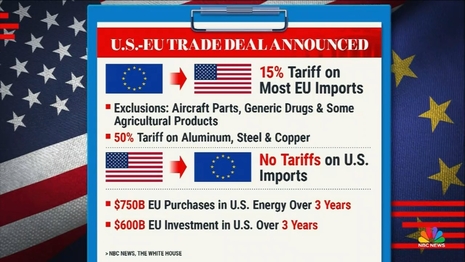On Monday morning, Axios published an article with the headline: “Trump trade deals prove access to the U.S. still matters above all else.” After months of fearmongering over trade wars and tariff effects on the economy, Axios was forced to admit Trump struck a huge win for the United States. But of course, a win couldn’t be a win as they whined about the U.S. coming out ahead.
The article opened up with the whiny line “In the Trump-dominated global economy, the U.S. gets plenty but gives nothing in return.” It seemed like a dig that ended up showing exactly what the Trump administration had been advocating from the beginning, an America first policy.
If America had gotten an unfair, or net neutral deal, Axios would have run with it as a failure of the Trump administration, instead it’s Trump’s fault for not giving anything in return?
As the saying goes: “You can't have your cake and eat it too.”
Axios neglected to mention that the EU had agreed to purchase $750 billion of U.S. energy exports through 2028, effectively moving them further away from being dependent on Russia for energy as the war in Ukraine raged on.
 Courtenay Brown, the economics reporter behind the article, was forced to weigh the significance of the United States markets when detailing why the EU agreed to this framework. Finally showing what the Trump administration had been trying to say the whole time, the U.S. markets were too strong for other countries to not come to the table and make a deal, as was evident with the EU.
Courtenay Brown, the economics reporter behind the article, was forced to weigh the significance of the United States markets when detailing why the EU agreed to this framework. Finally showing what the Trump administration had been trying to say the whole time, the U.S. markets were too strong for other countries to not come to the table and make a deal, as was evident with the EU.
They then tried to offer a critical approach by citing "asymmetric" trade deals and how they could hurt the USA. Fretting: “Opening markets benefits domestic producers only if foreigners are willing to buy — not always a sure thing, as with U.S. cars in Japan.”
The Japan auto deal hardly drew a meaningful correlation with a predicted outcome of U.S. exports to the EU. For one, the EU had a relatively open auto market compared to Japan, importing $7.2 billion in U.S. vehicles in 2024, and with tariff reductions on auto parts imported to the EU it’s poised to grow.
Secondly, the EU was a much broader deal that included the opening of EU markets to the USA including investments into US energy and military equipment, allowing for a wide range of investments into American producers.
The only critique they could really find from the deal was that it may or may not take time to materialize. “Investments promised by the European Union and Japan will likely materialize over an extended period as well,” Brown wrote, as if time was not a factor in any economic development.





